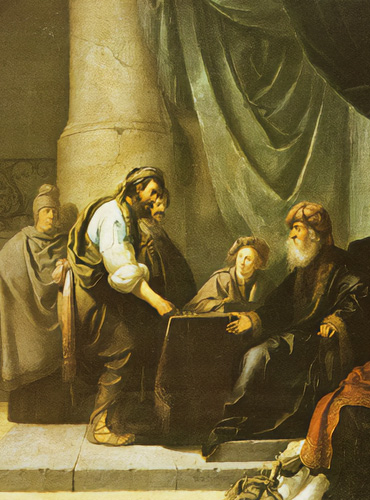Saturday of the Twenty-first Week in Ordinary Time – Mt 25:14-30
Today’s Gospel presents a lengthy parable about the talents that a master gives his servants and then sets off on a journey. In the parallel text from Luke’s Gospel, it is made clear that Jesus intended this parable for those who thought the Kingdom of God was going to appear immediately. His listeners thought that Jesus would overthrow the Romans and restore the kingdom of Israel, right then and there, but His parable emphasizes the king’s delay, and the need to continue working. Indeed, saints like Gregory the Great agree that here, too, the man on the journey is Jesus, and the “delay” refers to the time between His Ascension into heaven and His second coming.
Another thing that the saints emphasize consistently is that the varying number of talents is based, not on God’s stinginess, or His dislike of some people, but rather on the varying capacities and abilities of the ones receiving them. What is represented by the talents has been subject to different interpretations: some say the five talents refer to knowledge and understanding of supernatural realities, and the fewer talents to merely human or earthly training. Others say the five represent a fullness of knowledge of all things, whereas the lesser talents imply a more superficial knowledge. In short, we can see in those “talents” literally anything we have received from God, be it supernatural graces that are unique to us (gifts of understanding at a particular moment, our vocations), supernatural gifts that we share in with all the members of the Church, such as baptism, the gifts of confession and the Eucharist, and even natural gifts like our wills and intellects, the family we were given, the friends we had … the list goes on forever.
What is most important, however, is that God demands an accounting of what He has given us. On the one hand, this pushes us to be humble, as Saint Gregory writes: “the greater the gifts, the greater the reckoning for them. Therefore should every one be humble concerning his talents in proportion as he sees himself tied up with a greater responsibility.” If we have received more, we’ll have to render an account of more.
And what, exactly, is this rendering an account of? Speaking of the servant who buried his talent, Origen writes that “This servant seems to me to have been one of those who believe, but do not act honestly, concealing their faith, and doing every thing that they may not be known to be Christians.” In other words, the profit that is supposed to be produced is the growth of the Kingdom of God. When God gives us gifts, they are never just for ourselves, but rather for everyone, to help them come to believe. However, Pope Saint Gregory makes a further comment, one which should really make us think: “But,” he says, “there are many within the Church of whom this servant is a type, who fear to set out on the path of a better life, and yet are not afraid to continue in carnal indolence; they esteem themselves sinners, and therefore tremble to take up the paths of holiness, but fearlessly remain in their own iniquities.” Ouch. In other words, there are many people who fear God, knowing that He requires holiness, and the fruits of holiness. However, rather than start about the dirty work of conversion, they just sit around, fearful yet idle.
The point is that we need to be concerned with the daily process of conversion. Maybe we’ve been given lots of talents, or maybe we’ve been given few. No matter how many we’ve received, we need to set everything at God’s service and disposal. “The servant who of five talents had made ten, and he who of two had made four, are received with equal favour by the Master of the household, who looks not to the largeness of their profit, but to the disposition of their will,” says Saint Jerome.
Today, we can ask ourselves about the gifts we have received from God, and how we treat them. First, do we even recognize all the talents that we’ve received? Are we aware of all the great things that God has given us? Do we use them to love Him and serve our neighbors, or do we bury them?
Let us pray, in a particular way through the intercession of Mary, Refuge of Sinners, for the grace to give ourselves entirely in God’s service, and not to hold anything back.






